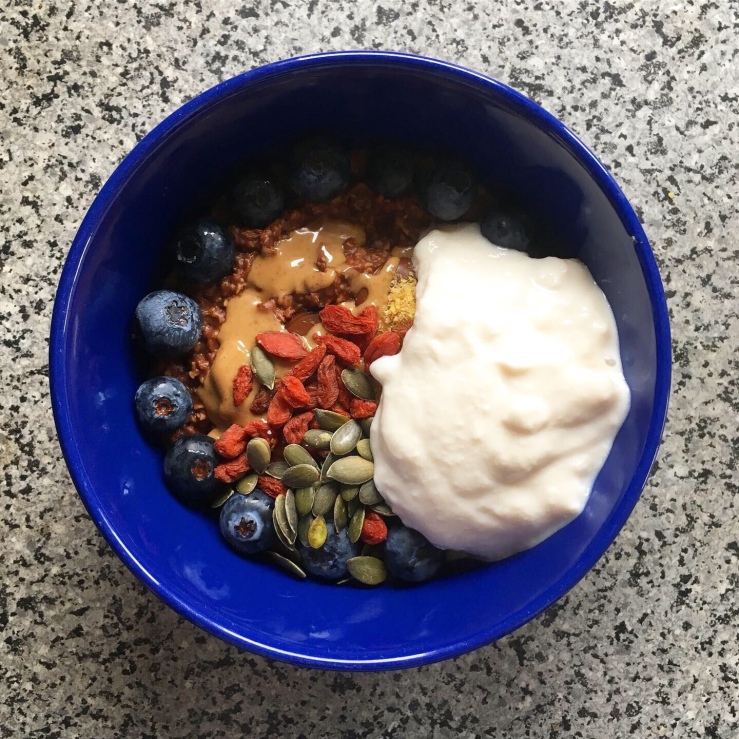Hello hello!

I just wanted to jump on real quick and write about skipping meals in recovery (although this frankly applies to anyone). I think many people, as part of disordered eating, may form habits of skipping meals every now and then, or even do so consistently.
Today, I had breakfast/brunch fairly late at about 10:30am, and then had some errands to run. I got back home, had a small snack, and started to feel hungry at about 4pm. And I felt bad, as in my mind having brunch meant I shouldn’t have lunch, and especially not at 4pm when I was going out for dinner in a couple hours… And then I stopped myself and thought: “whoa there, Linda“. These thoughts are not valid, and irrational. And I am so happy that I’m at a stage where I have the ability to recognise these thoughts for what they are, but I still need to remind myself about this as I’m on the journey to learn to live in harmony with my body.
This behaviour is something we want to stay away from in recovery, and for ever. Skipping a meal can essentially happen in two scenarios, so I’m going to go through them in order.
Scenario 1. Skipping a meal when you are kind of hungry.
If you are hungry, you should eat. I know it can be especially hard to act on hunger feelings, especially when these are tied with guilt and/or you’re struggling with disordered eating and body image issues. I think it’s very common to feel hungry, and then feel guilty for feeling hungry. For example, take feeling bad for having breakfast after an indulgent dinner. In the past, I might have decided that I should wait until lunchtime to eat in order to “compensate” for overindulging the previous night.
However, skipping a meal you’re hungry for, will not only dishonour your body by you ignoring its hunger signals. It will also mess up for future you, by making you ravenous and causing you to overeat at the next meal, perhaps bingeing on something you didn’t really want to eat in the first place, leaving you uncomfortably full. I do not want to villify overeating per se here; I’m talking about the kind of overeating that makes you feel mentally unwell, and that is detrimental to your health. We all overeat regularly, and that’s fine, it’s part of being human and essential to enjoy life!
Scenario 2. Skipping a meal when you are not hungry.
I believe in intuitive eating, and I subsequently don’t believe in forcing yourself to eat when you don’t want to. However, there are exceptions to this. If you have the luxury to work from home, or will have access to a proper meal later on in the day, fine; you can probably be a bit less rigid around your meal times.
But, if you are planning on skipping a meal, knowing full well that you will not have access to food for a little while (due to being out and about, being stuck at school lessons, or at work) – think again. You are either consciously or unconsciously restricting in this scenario, because you are setting yourself up to be caught in a situation similar to scenario 1 later on: making you skip a meal/delay your next mealtime despite being hungry.
Therefore, it would make sense for you to never skip meals, as far as doable. And if you ever catch yourself thinking: hmm, I’m not really feeling like having breakfast/lunch/dinner/my scheduled snack right now – ask yourself why. What’s going on? What are the circumstances of the scenario you’re finding yourself in? Are you setting yourself up for future restriction?
Solutions. EAT.
It’s the solution for both scenarios.
If you are hungry: EAT.
- If it’s not appropriate for you to have a full meal (because you’re for example heading out to dinner in an hour), ensure that you have a substantial snack instead.
- If you’re not a breakfast person, make sure that you bring yourself something substantial and nutritionally adequate to eat for when you do get hungry. With that being said, though, I recommend forcing yourself to eat something for breakfast, because even though you may not be hungry, it has been shown to stabilise your blood sugars throughout the day. This is why I’m not really a fan of intermittent fasting anymore (more on that later!)
- If you are hungry, but you feel like you just ate – just eat again, because you probably didn’t have enough to eat at your last meal for your appetite! Some days, one is simply hungrier, and that’s normal.
The point I’m making may seem quite obvious, but it frankly took me a while to make that connection and was an important part of recovery. I don’t think people realise how eating disorders mess with eating habits, making things that should seem really straightforward feel incredibly complex.
I hope that this was helpful to someone. If you want to talk, connect with me either on here, on my other blog lindadoesvegan, or on my instagram @lindadoesvegan where I’m pretty active 🙂
All the love in the world,
xo Linda

